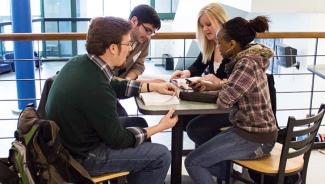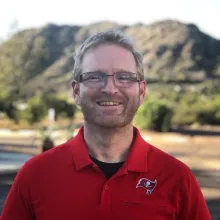Reading the Bible with a Diverse Community

We’re sharing some of our favorite posts from over the years! This post was originally published in April 2013.
Each of us wears cultural lenses.
Our cultural lenses shape our worldview, our relationships, our behavior … even the way we read the Bible.
Think about that: your cultural lenses may distort your reading of the Bible. But your cultural lenses may also serve as a gift to your community. They’re wild things, these cultural lenses.
If you’re like me, though, you’re often completely blind to cultural lenses.
Discover Your Lenses
I discovered my cultural lenses in a diverse small group. To my left were African Americans. To my right were Asian Americans. Across the circle — we always sat in a circle — were our White folks. And then there was me: White and Cuban, jumbled together.
We were talking about Ephesians, a letter written by Paul the apostle. In it, Paul talks about the diverse Christian community that Jesus is creating in the world.
When we shared what jumped out to us in Ephesians 2, my African American and White friends mentioned reconciliation. My Asian American friends noticed peace with God our Father. But all I saw was this: “He made one new man out of the two.” Paul uses a biracial person as a metaphor for the community Jesus is building. And I noticed it. No one else noticed it. That’s when I saw one of my cultural lenses for the first time.
The Secret about Cultural Lenses
Here’s the secret about cultural lenses: the best way to discover them is to read the Bible in a diverse community.
Read the Bible with people across the ethnic spectrum.
Read the Bible with men and women.
Read the Bible with people of different ages.
Read the Bible with people who are more and less mature than you.
Read the Bible with people who have lots of faith and with people who have lots of doubt.
The broader, the better.
Share Your Lenses
Your background, experiences, journey through life — really, everything about you — have positioned you to read God’s Word uniquely. In other words, your unique lenses, through which you read the Bible, are gifts from God.
The rest of us need your lenses. Much dysfunction in the Christian community stems from our failure to look at God’s Word through the diverse set of lenses he’s given us in each other. When we cluster around people who only share our lenses, we miss important things.
I was reminded of this recently at my church small group. In the current group I’m in, most of the other members have a lot more life experience than me. During one discussion, my friend Erika pointed out a fresh angle on a familiar passage: a man born blind miraculously receives sight, but this might cost him his job as a panhandler. How’s he going to make a living? Was it worth it? Yes. Was it easy? No.
I’ve read this passage a dozen times and never noticed the job aspect. But then again, I’ve never started my own business, never scrambled to feed my family, never wondered if my spouse’s company would survive an economic downturn. I need people like Erika to see what I cannot see and share what they see with me.
I’m glad Erika shared with me. She has a gift. So do you. Share it.
Challenge Your Lenses
None of us comes from a perfect culture. All our cultures need Jesus’ redemption. Cultural lenses get scratched.
A few months ago, a young man on campus shared that he felt that the Bible permitted him to hit a woman if she got out of line. Given his background and culture, I understand why he saw this in Scripture. But he was wrong.
This is the trickiest aspect of cultural lenses. How do I know when someone has a scratch on a cultural lens? How can you distinguish between diversity and error?
I don’t have a perfect answer. But I’ve learned this: you can tell a tree by its fruit. Over time, the fruit of healthy cultural lenses is a person who grows in love for God, God’s Word, God’s people, and God’s purposes in the world.
God can and does mend our scratched cultural lenses. He does this by placing us in communities who receive our gifts and correct our errors.
Have you ever read the Bible in a diverse community? What was it like? If you’ve never experienced this before, search for an InterVarsity chapter near you.







